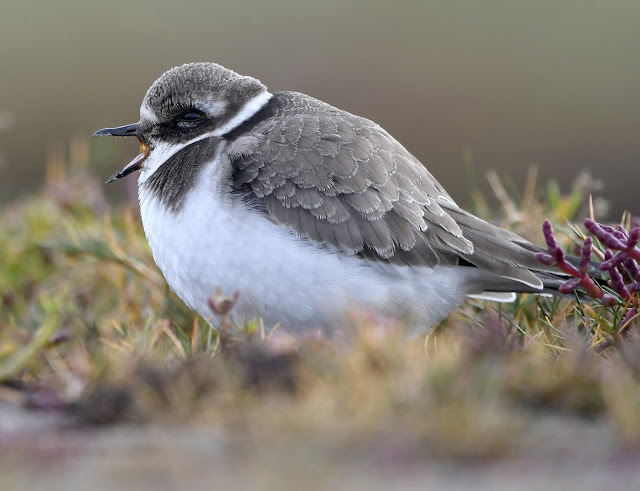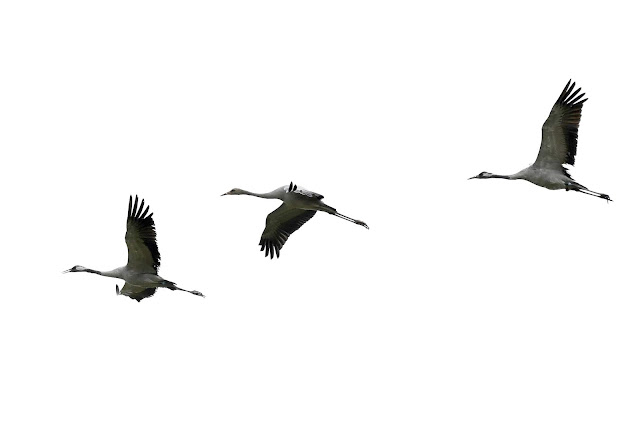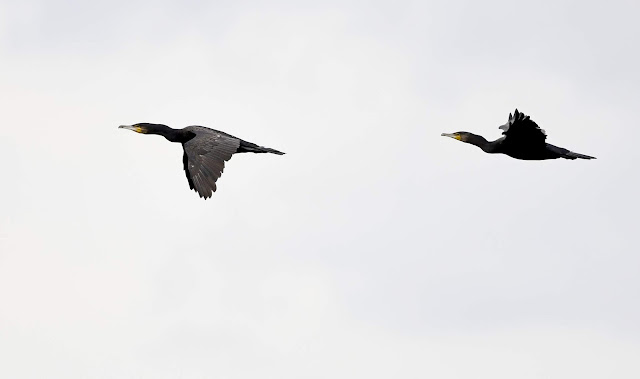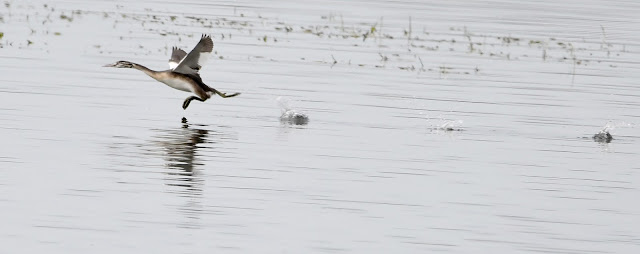Such a delightful bird!
It attracted quite a few birders and photographers and was enjoyed by everyone as it walked and swam about in puddles constantly on the lookout for food.
It was quite distant as the water had receded quite a bit leaving a shore with sand and mud exposed. No-one got any closer than the steps that led down to the sand whilst I was there, although there was talk about wishing to get closer. Grey Phalaropes are confiding birds of the arctic, so rarely, if ever see humans, so have no natural fear of them.
However, there were many other birds about where it was feeding, including Great White Egret, Grey Herons, Little Egret, Mediterranean, Common and Black Headed Gulls, Teal, Cormorants and Mallards, and these certainly would've been disturbed by anyone going down onto the sand to get closer to the Phalarope.
This is all a very emotive subject in the birding and photography world, and later, on Twitter, there were debates about the do's and don'ts on approaching this bird in particular which came about after some people posted much closer pics of it.
Apparently dogs and dog walkers had 'put up' all the other birds, leaving the Phalarope on it's own. A couple of photographers had then got down on the sand and sat quietly waiting for the Phalarope to approach them. They hadn't disturbed the other birds, the dogs had, but it could be argued that their very presence on the shore would prevent the other birds from returning to a spot they clearly favour.
They were shouted at by birders who stayed on the surrounding footpath with their telescopes. The Phalarope wasn't disturbed at all, and the guys got some super close up photo's. These people use fieldcraft to get better shots, as I do, but there are also a small minority of photographers who were never birders before and have no fieldcraft skills and go wading up to birds, scaring them away. They give bird photographers a bad name, and general birders tend to lump us all in together under the rather derisory term 'Toggers'.
As both a birder and a photographer, I can see both sides of the argument.
When a rare bird turns up, such as the Grey Phalarope, birders naturally want to see it, and bird photographers naturally want to photograph it.
The problems arise due to an unspoken competitiveness amongst some bird photographers. They all want to get the best shot of the rare bird! This is only natural, but we need to keep a number of things in mind.
Firstly the welfare of the rare bird itself. They are rare for a reason. Usually they have been blown off course during their migration, so are tired, vulnerable and need to feed and rest for a day or 2 to build their strength sufficiently to enable them to go on their way and hopefully reach their initial intended destination.
Secondly, the welfare of any other birds, and nature that could be affected by attempts to photograph the rare bird, including the enviroment it finds itself in.
Thirdly, we have to think about other birders and nature lovers that would like to come and see and enjoy the bird themselves. Some people come hundreds of miles just to see a rare bird, and you could understand their annoyance if a hapless photographer had scared the bird away and their time, travel and money spent getting there had all been wasted!
This also goes for general birders too, not just photographers. Twitchers are birders who specifically travel the country at the drop of a hat on the news of a rare bird turning up, and they can be just as competitive as some photographers. Both groups have 'bad' individuals who will either see or photograph a rare bird, then intentionally scare it off so no-one else can see or photograph it!
I used fieldcraft at the Huntspill seawall near Burnham on Sea earlier to get close to a couple of Ringed Plovers. I lay down flat and literally dragged myself slowly towards the birds using just my elbows and toes! It was agony!! I got some lovely photo's though!
However, the difference was that the birds were not disturbed at all by my presence, there were no other birds around to disturb, and no other people about that wanted to see them!
I backed off in the same way, and the birds never moved. I hurt all over, but it was worth it!
The debate will rage on.
Personally, I think if you can get close to a bird without disturbing it or others around it, and you are on public land, then there shouldn't be a problem at all. This is where a bit of knowledge and fieldcraft come in.
Another thing, my photo's of birds are enjoyed by many people who either can't get out and see birds for themselves or live in other countries where they don't see many of the UK species.
I get so many comments and messages from people all over the world saying that my photo's brighten their days, and I love to share my pictures with them!
Not all bird photographers have purely selfish motives. Most of us take pride in what we do, and want to spread a bit of joy to others. This in turn gives people a greater appreciation of nature, which can only be a good thing!
I saw some top people at Cheddar reservoir enjoying the Phalarope, including Jmaes Packer, Lee Dutton, Les Mears and Derek Salisbury, who spotted a Bank Vole by the surrounding wall and pointed it out as it ran between my feet and sat between my trainers!!
We tried to protect it from passing dogs, walkers and vehicles, it was very exposed out in the open and it went and 'hid' under Derek's camera bag strap on the wall! Eventually, James came along and picked it up carefully and released it safely in the grass on the other side of the path. Well done everyone..... it was very cute and you rarely get a decent view of one!
Below are pics and videos of the Grey Phalarope, Bank Vole and Ringed Plovers, plus photo's of magnificent Somerset Cranes, Dunlin, Great White Egret, Kestrel and Mediterranean Gull;
^Above^ - The wonderful Grey Phalarope at Cheddar reservoir (Photographed from afar!)
^Above^ - Footage of the Grey Phalarope constantly searching for food!
^Above^ - Ringed Plovers at the Huntspill seawall near Burnham on Sea in Somerset.
^Above^ - Ringed Plovers and Dunlin at the Huntspill seawall.
^Above^ - Dunlin at the Huntspill seawall.
^Above^ - Meadow Pipits at the Hunspill seawall.
^Above^ - Big flock of Shelduck off the Hunspill seawall.
^Above^ - Great Black Backed Gulls, Cormorants and other Gulls off the Huntspill seawall.
^Above^ - Common Cranes near Stathe in Somerset.
^Above^ - Footage of the Cranes flying right overhead and landing!
^Above^ - Kestrel near Stathe.
^Above^ - Grey Herons near Stathe.
^Above^ - Group of Mute Swans near Stathe.
^Above^ - Cormorants near Stathe.
^Above^ - Collared Dove near Stathe.
^Above^ - Grey Heron and Cormorants at Durleigh reservoir.
^Above^ - Carrion Crow at Durleigh reservoir.
^Above^ - Pied Wagtail at Steart Marshes in Somerset.
^Above^ - Greenshank at Steart Marshes.
^Above^ - Meadow Pipit at Steart Marshes.
^Above^ - Common Darter Dragonfly at Steart Marshes.
^Above^ - Blackbird at Ashford reservoir in Somerset.
^Above^ - Male and female Tufted Duck at Ashford reservoir.
^Above^ - The cute Bank Vole at Cheddar reservoir!
^Above^ - Footage of the Bank Vole 'hiding' behind a bag strap!
^Above^ - Mediterranean Gull at Cheddar reservoir (Nearest bird) with Black Headed Gulls.
^Above^ - Common Gull and Black Headed Gull at Cheddar reservoir. (Black Headed Gull has the black dot by the eye and is smaller.)
^Above^ - Great White Egret at Cheddar reservoir.
^Above^ - Little Egret at Cheddar reservoir (With Teal in the bottom pic).
^Above^ - Grey Heron at Cheddar reservoir.
^Above^ - Juvenile Great Crested Grebe running on water at Cheddar reservoir.
^Above^ - Cormorants with Gulls and Swans at Cheddar reservoir.
^Above^ - Cormorants with a Grey Heron at Cheddar reservoir.
^Above^ - Magpies and Carrion Crow at Cheddar reservoir.
^Above^ - Mute Swans at Cheddar reservoir.
^Above^ - Royal Navy helicopter carrying containers with some substance or other over Stathe in Somerset.
























































































































































No comments:
Post a Comment